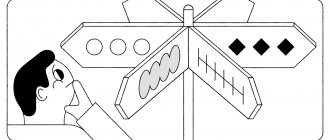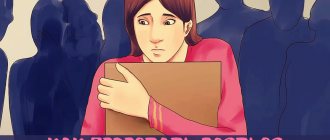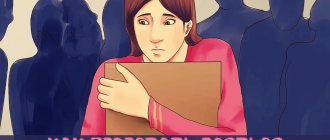This phobia is usually formed against the background of strong experiences and manifests itself as a result of emotional attachment to one’s parents, relatives, or other half. The degree of involvement indicates the level of manifestation of the problem. On the one hand, it seems that the fear of losing loved ones is completely natural and justified. And it’s hard to disagree with this. However, when it becomes excessive and crosses some boundaries, there is a danger of neurosis. For this reason, it is imperative to work with him and not allow the situation to significantly worsen.
Search for reasons
First, let's try to figure out what could provoke increased anxiety for loved ones. Of course, each person will have their own underlying reasons, which can be identified in individual work with a psychologist. But here are the two most common reasons:
- early loss of one of the parents or a painful separation that was not fully experienced. Then the fear of repetition of the traumatic event remains in the unconscious;
- lack of inner support, deep connection with oneself and personal meaning in life outside of family and relationships with others.
Treatment of obsessive fear of death
Treatment is prescribed by the doctor individually. There is no universal cure for thanatophobia. Each sick person is given his own scheme, a combination of medical methods and psychological techniques, aimed at recovery and relief from painful anxiety. The most common methods of therapy are:
- Pharmacotherapy. The fastest and most powerful method. Drugs from the group of tranquilizers, neuroleptics, antidepressants, and neurometabolic therapy are used.
- Physiotherapy. Electro-sleep is a physical therapy that helps relieve painful anxiety.
- Psychotherapy. A large number of psychotherapeutic techniques are effective for thanatophobia: cognitive psychotherapy, psychoanalysis, hypnosis and trance methods, relaxation training, etc.
- Biofeedback therapy (biofeedback).
- Therapeutic massage and physical training.
Other methods: diet therapy, therapeutic fasting, sleep deprivation, water procedures.
In most cases, the obsessive fear of death is completely reversible. Treatment is carried out both at home and in a hospital. The average course of active treatment is about 10 days.
Fear of losing yourself
If the reason lies in an unprocessed loss, then this topic should definitely be discussed with a specialist. The way to solve the problem in this case is different for everyone.
But what happens if the cause of fear lies in the second option? In this case, the sense of one’s own “I” is built through relationships with loved ones. Who am I if not a mother, not a daughter, not a wife, not a sister - what is my life?
And then the fear of losing someone from your family is more than the fear of losing a loved one. It's largely the fear of losing yourself.
With such a value on relationships, we tend to overly focus on others, trying to make them feel good. And we often forget about ourselves. As a result, this leads to a weakening of the connection with ourselves. We forget about our desires, we are not in search of our own meanings: “I feel good when they feel good.”
What else can support and intensify these worries about loved ones? This is an unconscious feeling that our anxiety makes some contribution to the situation: when I worry, I at least do something. This is a kind of protection against the inability to control the future.
Fears and phobias: where is the line?
When talking about any type of fear, it is worth understanding that fear is not just one feeling, without shades. Fear has a whole gradation of feelings, from mild anxiety to severe panic. What is the name of the strongest fear that cannot be rationally corrected? Phobia.
Fear and phobia are slightly different things, you need to understand this. There is usually some very real reason for fear. If we are talking about a phobia, we are talking about a strong, uncontrollable and sometimes unmotivated fear. A phobia not only causes anxiety, which can be rationalized, it prevents a person from sometimes performing the simplest everyday operations.
Fortunately, phobias are treatable. Yes, the path is long, long and hard. But at the end of the path, healing and a qualitatively new life usually awaits. For treatment, a combination of professional assistance from a psychotherapist and psychiatrist is used. The first is needed to find the cause of healing the mental trauma that gave rise to the phobia, as well as to develop an alternative plan for living your life. A psychiatrist is needed in order to normalize the condition during psychotherapy and adapt the person to life. Medical reinforcement (tranquilizers, antidepressants) is also usually used.
The Negative Work of Fear
It is clear that this is an illusion. Our experiences do not help our loved ones in any way, do not give us control over the future, but they significantly worsen our lives.
- Fear consumes our mental energy, exhausts us, and it is difficult for us to engage in our own life and enjoy it.
- Fear narrows our consciousness, we stop noticing the good things in our life and the opportunities that could improve it.
- We waste time on these experiences, which no one will make up for us.
Signs
Fear develops gradually due to frequent and intense experiences. Initially, a person is often visited by obsessive and disturbing thoughts. He often begins to get nervous and afraid of something.
Then he becomes very intrusive. Every day he makes several calls to loved ones, constantly asking if everything is okay and if anything bad has happened.
Any news about missing children or adults in the news causes panic and hysteria. After such news, the patient cries for a long time. The disease develops gradually. Panic attacks may become more frequent. They have the following manifestations:
- cardiopalmus,
- bad feeling,
- dizziness,
- difficulty breathing,
- high or low blood pressure,
- slight trembling
- increased sweating,
- frequent headaches, etc.
The patient begins to have problems sleeping. He may fall asleep, and if he does, he often wakes up in a cold sweat. I have nightmares.
If the disease progresses, nervous breakdowns may occur. For example, for parents when their child is at a distance and for some reason stops answering calls. This can become the initial stage of a disease called mental neurosis.
The patient compulsively calls relatives several times a day
How to help yourself?
Such fears are quite deep and individual, so it is difficult to give general recommendations here. However, if you are susceptible to this kind of debilitating anxiety, you can try the following:
- Realize that these worries are not only meaningless, but also bring harm to our lives: “If this does not help me or my loved ones in any way, then why do I need it?”
- Catch yourself in these fears and return to the present moment, because fear refers to the future, what has not yet happened and is unknown when it will happen.
- Returning to the present, try to fully enjoy what is happening, notice all the good things, spend more time with your loved ones - now they are still with you.
- Take care of yourself, understand your needs and desires. Do not focus only on others, but ask yourself: “What do I want and how can I do well for myself?” Strengthen your connection with yourself.
- Explore your life outside of your relationships with family and friends: your professional life (does it bring you enough satisfaction and meaning?), your hobbies (do you have a hobby that gives you positive emotions?), your small joys (those that only for you). And invest more of your attention and energy in these areas. ⠀
And then, perhaps, your anxiety will ease, and you will have more space for yourself and for life in all its fullness and depth.
The death of a loved one is always a huge grief. Death from coronavirus adds additional pain to completely normal, but no less difficult, experiences.
It is very important to understand that this is an event that cannot be experienced instantly; it takes time to believe in it, accept it, and rebuild your life taking it into account.
The very confrontation with the fact of the finitude of a loved one’s life is very difficult to accept. This causes a strong feeling of helplessness and powerlessness. At the same time, it is known that in order to make plans and not live one day at a time, it is important for a person to feel his ability to control the situation, to believe that the future is predictable and can be influenced. Unfortunately, when faced with the death of a loved one, it is these beliefs that must be partially revised. Otherwise, continuing to consider life to be completely controllable, a person begins to look for those responsible for what happened, going through what exactly those around him and himself could have done. And then, instead of supporting each other in common pain, people disperse, violently hurting themselves and those around them.
In addition, the more difficult the relationship with the deceased, the more, oddly enough, you have to mourn. Indeed, in addition to the loss of real relationships, in this case a person loses and mourns the hope that these relationships will improve, conflicts will be resolved, there will be understanding and spiritual closeness. It is important to remember this, not to beat yourself up, and to give yourself time and space to mourn. At the same time, it is important to understand that when experiencing this loss, you think about the relationship with the deceased, remember, and feel sad. And that's completely normal. After all, to say goodbye to dreams, you need to understand what exactly you dreamed about.
With any death of a loved one, those around us are faced with the reality of the finiteness of life for each of us. What intensifies our own feelings about ourselves, and raises important questions that are usually classified as existential: what makes life meaningful, what is important for you, what you want to do and what is scary not to do, what you dreamed of and what can be done from it bring into reality what kind of relationship you want, with whom the relationship is important.
Why can the death of a loved one from coronavirus be especially difficult?
First, it shows the general danger of the situation. And since each of us hopes that neither he nor his loved ones will fall into this percentage, this tragedy increases the general feeling of danger and vulnerability.
Secondly, when someone dies in a hospital, loved ones do not always have the opportunity to care for him in the last days of his life and say goodbye to the deceased during his lifetime. This can create feelings of guilt and regret, which intensify grief and can prolong mourning.
Thirdly, death from coronavirus is also more difficult to experience due to the fact that, often, there is no opportunity to say goodbye to the deceased and hold funerals and other farewell events accepted in the culture as is customary, and to share grief with all loved ones due to for rules related to the epidemic situation or due to the inability to take part in them due to one’s own poor health.
The suddenness of death, which occurs against the backdrop of positive dynamics and confidence in a favorable outcome, can add additional pain to the experience of losing a loved one from coronavirus.
Moreover, if a person died during a pandemic and from Covid, the grief of his loved ones is not alleviated by the knowledge that there is a pandemic around and many are dying. On the contrary, it can interfere with grief and prolong it. Therefore, it is important to remember that the loss of a loved one, regardless of the period in which it occurred, is bitter and significant.
It is important to remember that the loss of several loved ones from coronavirus greatly aggravates the experience of grief.
How can you help yourself get through this period?
Feelings of depression, grief, regular mental return to a deceased loved one, sadness, tears are completely normal during grief and help to gradually accept the loss, come to terms with it and move on with life.
But there is something you can do to make this difficult period easier:
- If it is not possible to personally meet at the funeral and wake with other people who also cared about the deceased, then agree to arrange a memorial meeting on Skype, Zoom, google meet or WhatsApp. This will provide an opportunity to remember the deceased together and make it easier for everyone to experience grief.
- Allow yourself to cry and grieve. Ask your friends at what time and which one you can contact if you feel you need to talk about the deceased, your relationship with him, his death.
- Allow yourself to think about the relationship with the deceased, about what was important to you, what you liked and what you didn’t.
- Take special time to take care of your physical well-being: make sure you eat on time, drink enough fluids, go to bed on time so that you feel warm and comfortable.
- For some people, art helps them cope with grief: both creating something themselves and getting acquainted with the work of other people dedicated to grief. This could be, for example, poetry, prose, music, painting.
- Think about what you could do in memory of your deceased loved one.
When to seek professional help:
- If you have persistent sleep disturbances.
- You have lost your appetite.
- If you experience very severe anxiety/depression/apathy.
- If your emotional reactions to loss are suppressed and do not find external expression.
- If your emotional reaction contradicts your ideas about the situation.
- If you feel unusual activity that is not usually typical for you.
- If six months have already passed, and your condition does not improve in any way and the grief does not subside.
Treatment methods
The fear of losing a loved one can and should be treated, and this should be started as early as possible. The best solution is an integrated approach consisting of several stages.
Psychotherapy
Using exposure therapy, a psychologist will teach the patient to switch from a “fixated” phobia to pleasant and more important moments in life.
We recommend reading: How not to be afraid of a fight and be brave
When diagnosing a phobia, the psychotherapist will use existential psychotherapy, showing the patient the basic values of life. Hypnotic procedures will help you get rid of phobias from childhood.
After diagnosing a phobia, if the situation requires it, psychiatrists will prescribe the necessary course of antidepressants, sedatives or tranquilizers.
Independent struggle
Having noticed the above symptoms in yourself in time, you can help yourself in the early stages to stop thinking about the death of a loved one:
- Don’t isolate yourself - communicate more with your loved ones, ask them for advice. A confidential conversation will calm you down and eliminate dark thoughts.
- Use meditation, relaxation, aromatherapy to relieve tension and stress. In combination with thematic auto-trainings, they will give a lasting positive effect.
- For stable insomnia, use herbal sedatives - valerian, motherwort, peony. Read light fiction and beautiful poetry before bed.
- It's time for believers to remember God and start regularly attending church, confessing and taking communion. Father, having listened to the problem, will give the right advice and instructions, and teach you to be calmer about the inevitability of death.
- Don’t think about the future, but live in the present, work more, so that there is simply no time left for “dark” thoughts.
Experts recommend learning to cope with an impending panic attack of a phobia - convincing yourself that nothing bad will happen. It is better to minimize TV viewing completely, excluding negative news, and choosing to watch comedies and humorous programs. And if the phobia begins to “cover”, it is recommended to stop it with the help of breathing techniques. To do this, take a deep breath, hold your breath for 4-5 seconds, then exhale for a long time for 4-5 seconds. Repeat 5-7 times.
This is interesting:
Is a relationship possible after cheating?
How relationships develop between a man and a woman.
How children develop and the characteristics of communication with them.
Video
Coffee capsule Nescafe Dolce Gusto Cappuccino, 3 packs of 16 capsules
1305 ₽ More details
Coffee capsules Nescafe Dolce Gusto Cappuccino, 8 servings (16 capsules)
435 ₽ More details
Samsung 4k monitors
Consequences
The result of the formation of fear of loss is the fear of harming loved ones or oneself. Most often it develops in people with vegetative-vascular dystonia (VSD). In psychology it refers to obsessive-compulsive disorder.
It manifests itself as a panicky fear of harming others. Various inappropriate thoughts arise. The patient may begin to hallucinate. It seems to him that he did something terrible, although in reality this did not happen. The result is that he constantly lives in fear for his life. Tries to isolate himself from others. In a fit of anger, he is afraid of harming others or even killing someone.
Diagnosis of the disease
Fear of crowds - what is this phobia called and how does it manifest itself?
The phobia of losing loved ones can be successfully treated subject to timely diagnosis and the patient’s conscious desire to part with his groundless fears. The following methods are used to diagnose the disorder:
- Conversation with the patient alone;
- Questionnaire in writing;
- Conversation with the client's relatives;
- Playing out a problem situation with the patient in any game form.
Timely diagnosis speeds up the treatment of phobias and increases the chances of success. However, autophobia is insidious in that it is difficult to recognize. Symptoms of the disease may be similar to other psychological disorders. In addition, changes in the psyche do not occur abruptly, but gradually; people may not notice them for a long time.
The diagnosis is made during a face-to-face conversation with the patient. Any communication with a psychologist in writing (questionnaires, correspondence by email or on social networks) does not give the doctor the right to diagnose autophobia.
Diagnostic methods depend on the gender, age and temperament of the patient. Extroverts readily respond to the invitation to “have a heart-to-heart talk” and talk about their fears. The effect will be enhanced if the client’s close people take part in the conversation. Art therapy methods are better suited for introverts, allowing them to express anxieties and fears in a veiled form, through artistic images.
It is good to use art therapy for diagnosis
Interesting. Good results are obtained by such a diagnostic method as drawing your feelings and emotions. Even those who last drew in childhood usually respond well to the invitation to depict their fears. Drawing helps the patient to relax and express in the form of artistic images what he is afraid of or does not want to talk about in words.
Reasons for fear of losing loved ones
Thanatophobia and autophobia, as a consequence, cannot be cured without knowing the main reasons that preceded this mental disorder. They are identified as a result of a conversation, filling out tests, and can be completely different in terms of statute of limitations and the reason for their appearance.
There are several causes of thanatophobia.
Postpartum depression
A young mother, against the background of postpartum depression (due to hormonal changes), develops a fear that the baby may die. In such a situation, it is important to tell your loved ones everything in order to take timely measures to get out of depression without harming the baby.
Childhood trauma
Causes:
- The mother's long absence at a time when the child needed her, and he felt unprotected and lonely.
- The divorce of parents or the death of one of them can also be a great trauma for a child.
- “Scary stories” told by relatives, terrifying the child, who, due to his age, believes in what is said. Everything can end badly - panic attacks, hysterics.
Sad experience of elders
When you see a bad example of relationships between parents, brothers, sisters and your significant other, where the relationship ends sadly - scandals, fights, divorce. Fear for future personal relationships settles in the heart.
Diffidence
Low self-esteem gives rise to jealousy and suspicion without reason. Such a person will always try to manipulate his partner, point out lack of attention, and keep everything under control.
Attention. Scary news in the media, especially with video reports, can cause severe psychological trauma.
Complete dissolution in a partner
In such a situation, a person will think about everything that concerns his partner, completely forgetting about himself as an individual. And in such a situation, the obsessive thought of losing a “precious soul mate” inevitably appears.
We recommend that you read: Fear of holes and a large number of holes
Loss of loved ones
Especially in childhood, this gives the realization that everyone is mortal, and irreparable things can happen at any moment.
What is taphophobia
Taphophobia is a whole complex of fears, one way or another related to funerals. This may include fears of cemeteries, funeral processions, coffins and even wreaths. In general, everything that in one way or another reminds of a burial.
Often, taphophobia occurs in combination with several other phobias. For example, thanatophobia (fear of death), pnigophobia (fear of dying from suffocation), nyctophobia (fear of the dark) and/or claustrophobia (fear of closed spaces).
Help from a psychologist
You need to consult a psychologist if the illness does not allow a person to live in peace, and the feeling of anxiety has not left for a long time. Initially, the doctor will determine the stage of development of fear in order to correctly prescribe treatment. It is usually implemented through a combination of cognitive behavioral and exposure therapy. Additionally, medications may be prescribed. Most often these are antidepressants.
At the first session, the psychologist wants the patient to answer the following questions:
- what happens if I lose a loved one,
- what is this fear associated with?
- what do I feel when I can't contact a person?
- what happens if a loved one bumps or hurts himself in some other way,
- what happens if I hurt someone,
- why do I worry so much about my loved ones?
- who said that something would happen to my family, etc.
This will help a person understand the essence of his problem and understand what is causing his feelings. The patient will see himself from the outside. This stage also involves describing the sensations that arise when the fear of loss or harm is activated.
In subsequent sessions, the doctor helps the patient get rid of fear by immersing himself in a dangerous situation. He asks the patient to close his eyes and imagine something that really frightens him. This could be the loss of loved ones, harm to yourself or family. It is important that the main signs of fear appear.
After which the terrifying picture in the subconscious changes to something pleasant. This could be visualizing dreams or imagining something that gives you a feeling of joy and happiness.
This is how a sharp change in thoughts and behavior occurs. This type of exposure therapy lasts about 20 minutes. The goal is to teach a person to cope with their fears and be able to switch to something positive when the phobia is sharply activated.
At the end of each session, the psychologist asks the patient to share his feelings. This allows him to evaluate the effectiveness of his work.
According to doctors, manifestations of fear in women are more pronounced. Therefore, treatment takes longer than in men. On average, the number of sessions is 7–8. But girls often need 10–12 sessions to completely heal and stop worrying about their family over trifles.
As it came, so it went ↑
Think back to some of your losses. For several years they collected money for a car, denied themselves expensive clothes, vacations at sea, and saved on everything. And a week after purchasing your brand new VAZ, hooligans stole it. We survived the tragedy with great difficulty.
Do you remember the gold ring with a small diamond that your admirer gave you? No?! You lost this precious decoration for him at the very first corporate party and weren’t even upset about it. As it came, so it went.
We evaluate losses by the costs of our physical, and more often emotional, labor that we invested in them.
As sad as it may be, even a person is dearer to us than the one for whom our soul ached more and our body suffered more:
- A remarkable man, philanthropist, altruist and genius suddenly and tragically ended his life. You knew him from afar, without taking part in his life. Just be upset.
- Is it worth comparing this feeling with the grief of a mother who has lost her child? And the child was also 33 years old. Only he was an ordinary slacker and drunkard. But the mother put her heart, sleepless nights and pain of experiences into her child.
Why are we afraid to stand out in the crowd? Read about the reasons for fear of public speaking. How to help a child overcome fear? Read here.
How is treatment for taphophobia carried out?
The surest and most reliable way to overcome phobias is psychotherapy. The methods that a psychotherapist or psychologist will use will depend on the direction in which he works. This can be the method of free associations, desensitization and NLP. There are many approaches to solving this problem, they have different effectiveness, but they work.
If you notice signs of taphophobia in yourself or a loved one, contact a specialist as soon as possible.
To relieve an acute condition on your own, it is recommended:
- take your mind off your thoughts with books, movies, music, sports, travel and relaxation.
- find as much data as possible about your phobia. The information will be useful not only for understanding your illness, but also for rethinking and reevaluating yourself and your life.
- minimize situations that lead to bright outbreaks of taphophobia (closed spaces, darkness, cold/heat, lack of oxygen, loud sounds, etc.)
- get support from those who suffer from the same problem (this could be forums, websites and various groups dedicated to phobias).
The main thing is to remember that a phobia can be corrected, don’t think that you will suffer for the rest of your life!
Information belongs to the website RevMed.info
Related posts:
- Medicinal treatment of stress In English, “stress” is translated as “tension, pressure.” For the first time this term...
- Insomnia or insomnia Insomnia or insomnia is the most common manifestation of sleep disturbance. By…
- Attention deficit hyperactivity disorder Attention deficit disorder (ADD) is a biological immaturity of the brain. How…
- Necrophobia: Fear of the Dead One specific type of fear or anxiety disorder is necrophobia...
Psychology of acquisitions ↑
The explanatory dictionary defines the word “loss” as the disappearance of something or someone. So it was, it was and it was gone. A wise Russian proverb says: as it comes, so goes. That's it!
A person comes into this world naked. All he has at the time of birth is his helpless body and his parents. Everything that then surrounds us is acquired.
But look how the fists clench when something hits them, how the hands reach out to everything, how quickly the baby learns to say the word “mine!” This normal innate instinct helps to survive not only in extreme situations.
It’s as if the baby knows that losses and loss await him ahead, and therefore strives to maintain balance.










